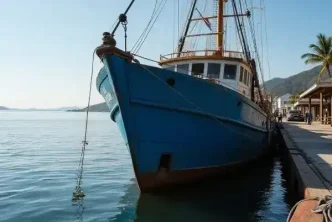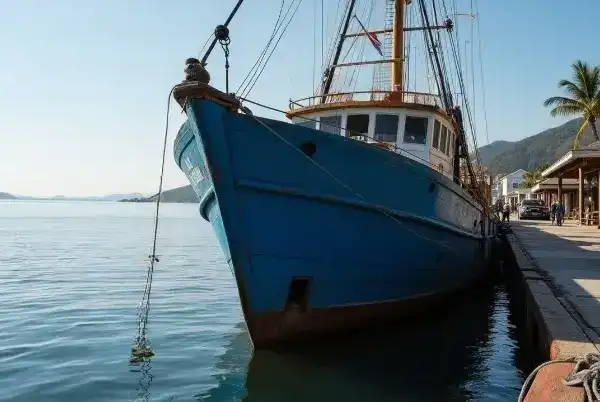Malaysia is navigating a complex landscape of economic opportunity and regional friction as it balances booming industries like tuna exports with trade disputes and upcoming diplomatic engagements. In the coastal regions of East Malaysia, the tuna industry is emerging as a significant economic driver, while in the political sphere, tensions with neighbors like Indonesia over trade policies simmer alongside preparations for the ASEAN Summit. At the same time, the growing challenge of electronic waste (e-waste) casts a shadow over the nation’s environmental credentials. This multifaceted story reflects Malaysia’s ambition to solidify its position as a regional economic powerhouse amid pressing domestic and international challenges.
Tuna Industry: A Coastal Economic Boom
In the waters off East Malaysia, particularly in areas like Sabah, the tuna industry is reeling in substantial profits, positioning the region as a potential global hub. Industry reports indicate that Malaysia’s tuna exports have surged in recent years, driven by demand from markets in Japan, the United States, and Europe. The sector’s growth is fueled by sustainable fishing practices and investments in processing facilities, which have created thousands of jobs in coastal communities.
Local fishermen and business owners have hailed the boom as a lifeline for economically marginalized regions. “This industry has given us stability and hope for the future” said Ahmad bin Ismail, a Sabah-based fishing cooperative leader, speaking to regional media. The economic impact is significant, with export revenues reportedly reaching 1.2 billion Malaysian Ringgit (US$260 million) in the past year, based on figures from industry associations. Government initiatives to modernize fishing fleets and improve cold storage infrastructure have further bolstered the sector’s competitiveness.
However, challenges loom on the horizon. Environmentalists have raised concerns about overfishing and the potential depletion of tuna stocks if sustainable practices are not strictly enforced. Additionally, the reliance on international markets exposes the industry to global price fluctuations and trade barriers. As Malaysia seeks to expand its footprint in this sector, striking a balance between economic gain and ecological responsibility remains a critical task.
Trade Tensions with Indonesia: A Looming WTO Dispute
While the tuna industry thrives, Malaysia’s trade relations with neighboring Indonesia are under strain. Indonesia has signaled its intent to challenge Malaysia’s anti-dumping duties on certain imported goods at the World Trade Organization (WTO). The duties, imposed by Kuala Lumpur to protect domestic industries, have been criticized by Jakarta as unfair and detrimental to bilateral trade. Indonesian officials argue that the measures disproportionately affect their exporters, particularly in sectors like steel and palm oil, which are vital to their economy.
“We are prepared to take this matter to the WTO if a resolution cannot be reached through dialogue” said a senior Indonesian trade official in a recent statement to regional press. Malaysia, for its part, defends the duties as necessary to safeguard local businesses from unfair competition. The dispute risks escalating tensions between the two ASEAN member states at a time when regional unity is paramount.
Analysts suggest that this disagreement could have broader implications for Southeast Asian trade dynamics. If unresolved, it may undermine confidence in intra-ASEAN economic cooperation, a cornerstone of the bloc’s mission. For Malaysia, the potential WTO case adds another layer of complexity to its economic strategy, as it seeks to protect domestic interests while maintaining cordial relations with its neighbors. The outcome of this dispute, whether through negotiation or international arbitration, will likely set a precedent for how trade conflicts are managed within the region.
Security Tightens Ahead of ASEAN Summit
Amid these economic developments, Malaysia is also gearing up for a significant diplomatic event—the ASEAN Summit, scheduled to take place in Kuala Lumpur later this year. Authorities have announced heightened security measures across the capital and surrounding areas to ensure the safety of visiting dignitaries and to prevent disruptions. The summit, which will bring together leaders from across Southeast Asia, is seen as a critical platform for addressing regional issues, including trade disputes, climate change, and geopolitical tensions in the South China Sea.
The Malaysian government has deployed additional police and military personnel to key locations, with checkpoints established at major entry points to the city. “Our priority is to create a secure environment for dialogue and collaboration” said a spokesperson for the Ministry of Home Affairs in a public address. These measures, while necessary, have sparked some public grumbling about traffic disruptions and restricted access to certain areas of Kuala Lumpur.
The summit offers Malaysia an opportunity to showcase its leadership within ASEAN, particularly as it navigates complex issues like the trade spat with Indonesia. However, the event also places pressure on the government to demonstrate its ability to manage security and logistics effectively. Any misstep could dent Malaysia’s image as a reliable regional partner, especially at a time when its economic ambitions are under scrutiny.
E-Waste Crisis: An Environmental Challenge
Adding to Malaysia’s domestic challenges is the alarming rise in electronic waste, a byproduct of rapid urbanization and technological advancement. The country is grappling with an influx of discarded gadgets, from smartphones to household appliances, much of which is improperly disposed of or recycled. Environmental groups warn that Malaysia risks becoming a dumping ground for global e-waste if stricter regulations and better waste management systems are not implemented.
Recent studies cited by local media estimate that Malaysia generates over 300,000 metric tons of e-waste annually, a figure that continues to grow as consumer electronics become more accessible. The improper handling of this waste poses significant health and environmental risks, including soil and water contamination from hazardous materials like lead and mercury. “We need urgent action to address this crisis before it spirals out of control” said Dr. Nurul Huda, an environmental scientist based in Penang, in an interview with a regional outlet.
The government has pledged to tackle the issue through new policies aimed at improving recycling infrastructure and cracking down on illegal e-waste imports. However, enforcement remains inconsistent, and public awareness of proper disposal methods is still lacking. For a nation striving to position itself as a modern, sustainable economy, the e-waste challenge is a stark reminder of the environmental costs of progress.
Balancing Growth and Challenges
Malaysia’s current trajectory encapsulates the dual nature of economic development in Southeast Asia—unprecedented opportunities coupled with significant hurdles. The tuna industry’s success in East Malaysia highlights the potential for niche sectors to drive growth and uplift communities, while trade disputes with Indonesia underscore the fragility of regional economic ties. Meanwhile, preparations for the ASEAN Summit test Malaysia’s diplomatic and logistical capabilities, and the mounting e-waste crisis demands urgent attention to prevent long-term environmental damage.
As Kuala Lumpur positions itself as a key player in the region, the government must navigate these issues with a careful balance of ambition and pragmatism. The outcomes of the trade dispute, the summit, and environmental reforms will likely shape Malaysia’s economic and political standing in the years ahead. For now, stakeholders across the spectrum—from coastal fishermen to international diplomats—watch closely as the nation charts its course through turbulent waters.
As these developments unfold, questions remain about how Malaysia will reconcile its economic aspirations with the pressing need for regional cooperation and environmental stewardship. The answers may well define its role in a rapidly changing Southeast Asia.















